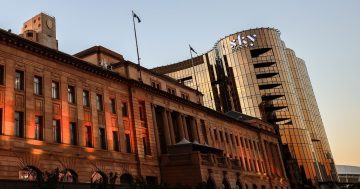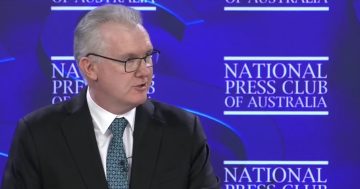
AUSTRAC is preparing to reveal money laundering and financial crime through a new set of specific industries. Photo: Josie Elias.
Dodgy lawyers, accountants, real estate agents and gemstone dealers beware, the Federal Government is coming for you.
The government is beefing up its financial intelligence capabilities to better identify sources of money laundering and the funding of crime in Australia, including terrorist activities.
And it has some special attention to give specific professions and industries.
The Australian Transaction Reports and Analysis Centre (AUSTRAC) has outlined new plans to reduce the harms from serious financial crime, and says it is turning its focus to a renewed push on enforcement.
AUSTRAC has released its regulatory priorities for the 2025-26 financial year, showing it is preparing to regulate “tranche 2” industries and targeting gaps in high-risk sectors such as cash and digital currencies.
Tranche 2 includes real estate agents, lawyers, conveyancers, accountants, trust and company service providers, dealers in precious metals and stones, and other designated service providers.
It refers to a set of proposed reforms that will extend Australia’s Anti-Money Laundering and Counter-Terrorism Financing (AML/CTF) regulations.
From 1 July, 2026, AML/CTF obligations will apply to certain services typically provided by tranche 2 entities.
AUSTRAC chief executive officer Brendan Thomas said financial crime damaged Australia’s financial system, so the focus now was on preparing those tranche 2 industries for the tougher regime headed their way.
“This year marks a regulatory shift – from regulation that primarily checks for compliance to one focused on substantive risks and harms,” Mr Thomas said.
“AUSTRAC will look at risk and behaviour at an industry and sector level rather than focusing solely on individual entities.”
As part of preparations to implement the major legislative reforms from the middle of next year, AUSTRAC is scaling up its workforce and systems to bring about 80,000 new businesses under the AML/CTF regime.
“We’re working with existing and new businesses to ensure they’re informed about what’s expected of them ahead of the changes,” Mr Thomas said.
“We will be more direct in communicating what we expect to see from sectors, and clearer about specific failings and risks we want addressed sector-wide.”
Intelligence capabilities will turn to identifying sectors that are not managing risk.
Those insights will be used to inform AUSTRAC’s regulatory priorities and enforcement activities.
“We are also focusing efforts where the risk of harm is greatest, for example in digital currencies, which allow funds to move across borders quickly, cheaply and virtually anonymously,” Mr Thomas said.
“Cash is also highly susceptible to money laundering because it is anonymous, accessible and widely accepted.
“While the use of cash in Australia is declining, more than $100 billion is still in circulation.
“We see money-laundering risks play out in cash-intensive businesses as well as through digital currency exchanges and other virtual asset service providers that facilitate instantaneous global transfers.”
Tranche 1 of the reforms primarily targeted the financial, gambling, and bullion-dealing sectors.
AUSTRAC has now also published a statement of regulatory expectations on its website, specifying its approach to both tranches.
“Whether you’re already part of the regime or preparing to come into it, we want you to be proactive in preparing and making sustained progress towards compliance,” Mr Thomas said.
“As new sectors come on the scene, they will look to established businesses for examples of effective management of money-laundering risk, so this is an opportunity to understand our priorities, improve compliance and help us lift standards across the board.
“We’re about to embark on the most ambitious overhaul of Australia’s anti-money-laundering laws in a generation and we’re determined to get it right.”
AUSTRAC is the Australian Government’s financial intelligence agency responsible for monitoring financial transactions to identify money laundering, organised crime, tax evasion, welfare fraud and terrorism financing.
Original Article published by Chris Johnson on Region Canberra.








